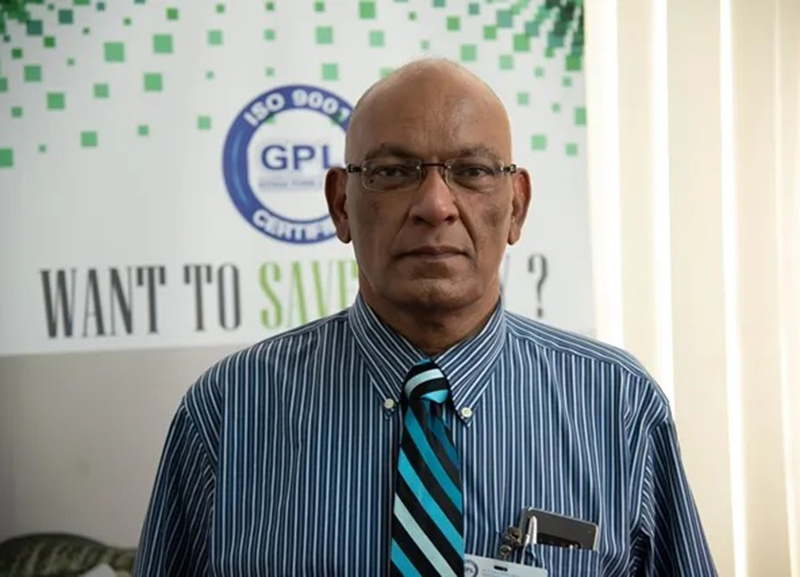With demand expected to increase during the upcoming holiday season, the Guyana Power and Light Company (GPL) yesterday sought to assure its customers that blackouts will only occur if there are emergency shutdowns as the company has the required generating capacity.
“In terms of outages, we don’t see exposure on the generation side. Of course with the network we always have an issue… and what we find happening around this time is we have people who are driving and they seem to be targeting the poles. So, we have a lot of those [accidents] and there is only so much we can do,” Chief Executive Officer (CEO) of GPL Bharrat Dindyal yesterday said at a press conference held at the company’s Kingston Head Office.
He was discussing preparations by the company for the Christmas holiday season, which usually sees an increased demand.
Further explaining the company’s readiness was Divisional Director of Operations Bharat Harjohn, who said that there is more than enough fuel and generators to meet the demand and announced that planned maintenance across the country will be halted on December 15 and resume until later in January.
“From a generation standpoint, we have enough reserve capacity. At Garden of Eden, we have a 46 megawatt plant there which is a new plant. We have a 22 megawatt plant, which is the BP one and we have another 6 megawatt small plant. But most of the sixty per cent of the power has to find itself to Georgetown to our control centre and then move up east. So if our transmission line fails us, for some reason, from bringing that power to the control centre or to Sophia for distribution, we will have a challenge.”
But with over US$600 million invested in the company, the issue of fixing the aged transmission and distribution system continues to be a challenge and setback for the utility company. Shutdowns on the aged Demerara-Berbice Interconnected System (DBIS) have been mostly technical.
Former CEO Albert Gordon had said in 2018 that GPL needed about US$110 million for the immediate upgrade of systems and that the company would have been pursuing getting the funding.
The current company CEO acknowledged that the utility is working to address the problem as part of its upgrade plans for the future but did not say how much of the funding has been obtained.
In addition to the upgrade of the distribution grid, Dindyal said that key to planning was tackling the decades- old problem of electricity theft which sees revenue losses of about $5 billion annually.
“We have actually resumed recently a focus on prosecuting people for electricity theft. That is going to be our major focus next year,” Dindyal said.
The company has warned persons against using illegal connections, saying that it not only does electricity theft account for most of its financial losses but that persons run the risk of endangering their own lives and others with the connections used.
And although the company has instituted a number of measures such as smart meter installation, it continues to be baffled at how persons here are able to bypass the systems and continue the theft.
“Policing? This has not been successful. We have thousands of people who have been caught who are in the courts; matters languishing because we can’t dispense with three, four thousand cases,” Dindyal said.
The CEO disclosed that it had invited and consulted with experts from a number of countries as it brainstormed upgrades to the utility company, especially dealing with electricity theft. According to Dindyal, those experts had expressed that Guyana was a unique case.
Although it has invested over US$640 million in various loss-reduction strategies, the country still has about 15,000 illegally connected street lamps. Vandalism of smart meters by contracted employees, including former power company workers, also continues, Dindyal noted, while adding that there are other instances where metrology boards are compromised.
But come 2022, the company will aggressively be pursuing closing the gap with ramped up monitoring , even as the CEO explained the risk that exercises poses to the company’s employees. Already a Loss Director has been appointed.
“That calls for a response; a team to go into those areas and that’s a huge problem right now. We are assessing how they mitigate the risk of sending in a team in an area where almost everybody stealing and they’re prepared to bring harm to anybody who tries to dissuade them from doing that,” Dindyal said.
He informed that about 1,900 Automatic Metering Infrastructure (AMI) capable meters have been installed as part of a 40,000 meters pilot project in the capital Georgetown. “What we are doing is going to a place where the system is so sophisticated that we can sit in an office and see what you’re doing with the meter at home.”
Knowing that persons will continue to try to bypass any system, the CEO posited that the only way a reduction in theft losses could come was if there was a change in the in culture and mindset of some persons, coupled with the changeover to upgraded technology.






